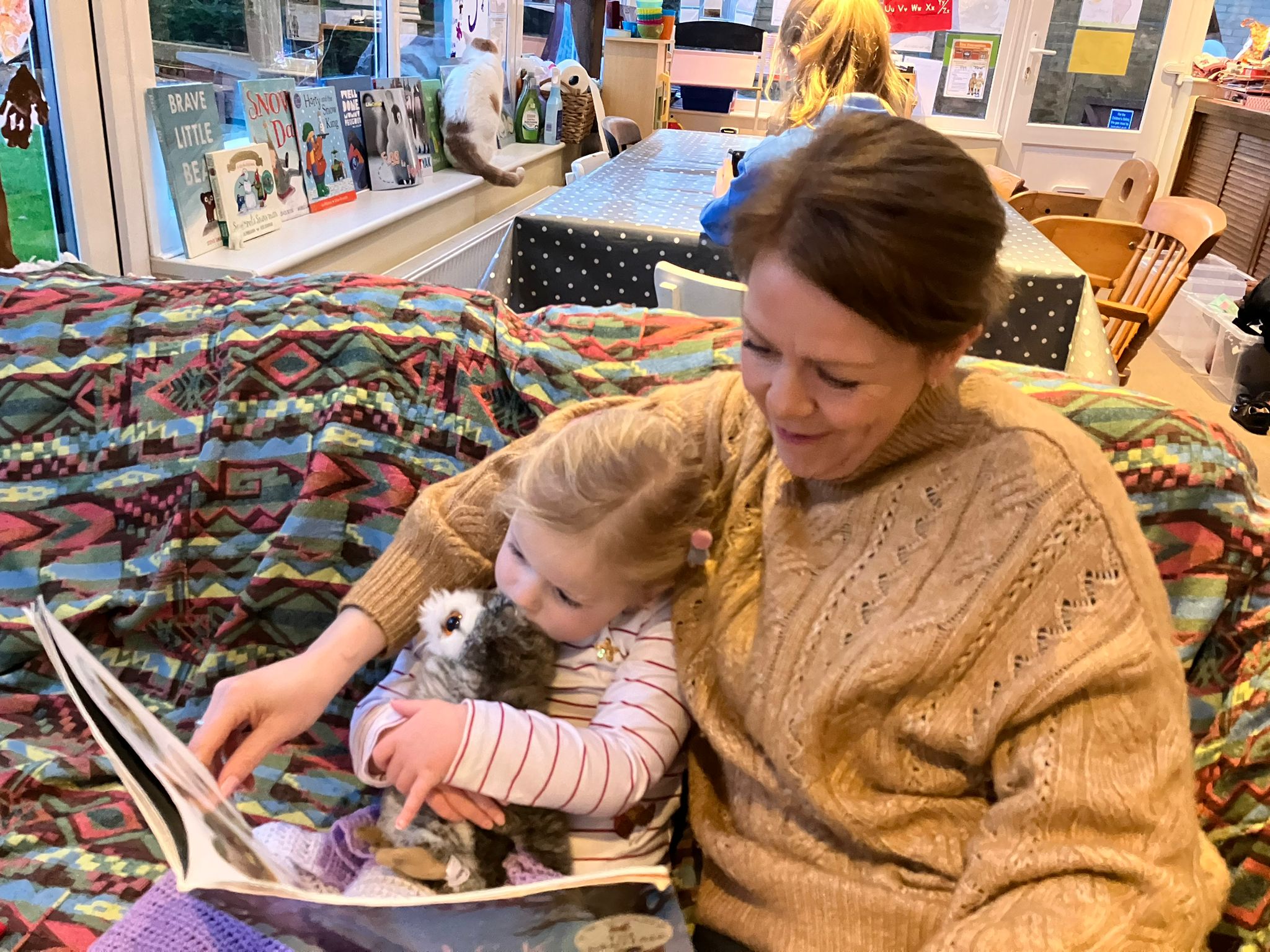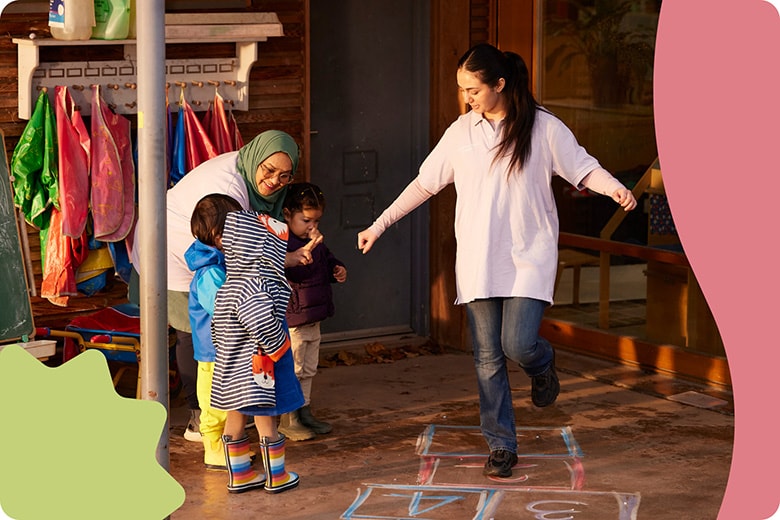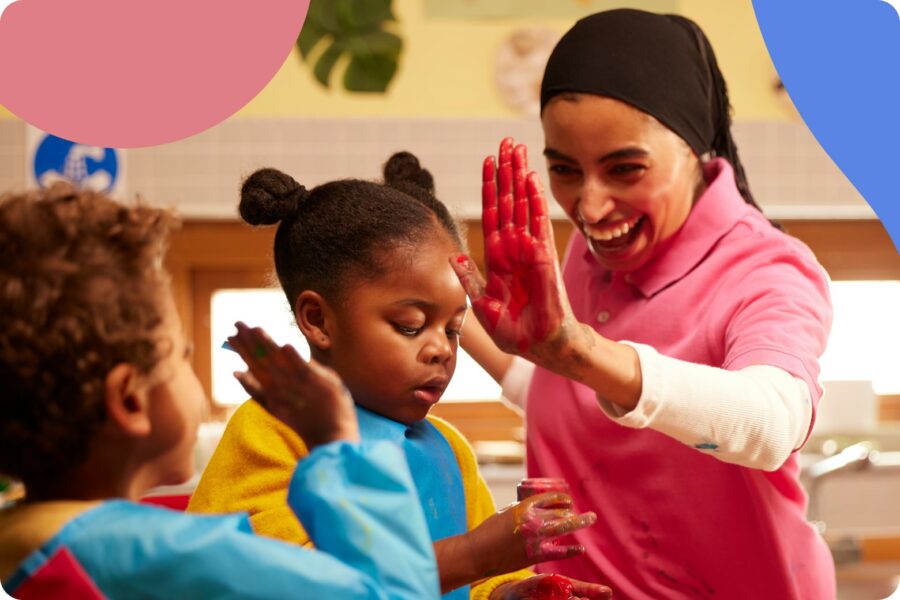Lyndsey – childminder

Tell us a bit about your background
What did you do before you joined the early years sector?
I have always worked with children. Before becoming a childminder, I was a primary school teacher combined with being a special educational needs coordinator. I also ran and lead the speech and language provision within a school, teaching children with speech and language delays, alongside my teaching role.
Tell us how you entered the sector. Was there a specific entry route you took?
I began my journey into childminding 10 years ago by taking an introduction to childminding course. I was fortunate that my teaching degree also covered early years so I had prior knowledge of the early years framework. I am now registered with Ofsted.
What qualifications did you have before becoming a childminder?
I had my primary school teaching degree, along with my introduction to childminding course. There are certain courses that are compulsory that I took too, such as paediatric first aid and safeguarding. Ongoing learning such as continued professional development (CPD) is very important to me and there are so many brilliant courses available to childminders.
What inspired you to join the early education sector?
I had always worked with children and love to be in their company!
Early years encourages autonomy and freedom in learning, and childminding allows me approach early education by following each child’s particular interests. I am able to shape the activities in ways that I know children will respond positively to.
Also on a personal level, after a long journey to be able to conceive my own child, I then wanted to be with her as much as possible. Putting her in to full-time childcare was not something I wanted, so childminding was a natural choice for me. It’s given me the opportunity to earn money whilst being a mother.
I also don’t have the challenges of agreeing flexible working with an employer. I can pick the hours, days and weeks I want to work. It gives me the work life balance I’d never had before and has allowed me to be with and look after my daughter.
Childminding ticks every box.
A day in the life
Every day is different!
A typical day for me begins at 7:45am when the children arrive.
After making everyone breakfast we head out on the school run. Then we return home where we often do, for example, a fiddly finger activity. This could be something like bead threading or play dough.
After this, it’s snack and story time. The children are encouraged to choose a story or share something of interest to them. We then often go out somewhere, this could be a park, library, soft play or the local beach.
Lunch time! We may take a picnic or return home for lunch. The younger children nap and then I often use this time to work on with the older toddlers on their individual learning goals.
Later in the afternoon we all head out on the school run. And return home to play in the garden or do an inside activity together. We then have dinner and I begin to prepare the children for collection by 5:30pm.
Every day is different, but routine is still very important.
Children respond well to routines and undoubtedly feel happy and comfortable when they are in a good routine.
What do you most enjoy about your job?
I enjoy the simple moments, when we are playing or working on something together – listening to the children’s ideas and thought processes and proudly observing how much they have learnt since the last time. Children can also be very funny!
I also enjoy being my own boss. I can make my own decisions, choose my working hours and holidays. I’m also very proud of growing my business, knowing that families actively seek me out because they trust me to care for their children is a huge endorsement and makes me feel as though I must be doing something right.
Childminding ticks every box.
How do you feel you’re making a difference?
I believe that childminders like myself provide a tailored service to suit all people with many different requirements and in doing so we support parents needs as well as their children’s.
We provide love, care, education and nurture on days where parents are not able to; supporting the children as they develop and grow. Seeing a child from as young as a baby grow up and be doing well in secondary school is something I love being a part of.
Can you share any highlights with us?
I worked with a family where the mother had put off returning to work for longer than she’d wanted to because of how anxious she’d become about leaving her child.
I made a huge effort to welcome them all and gradually helped the child to feel happy and comfortable at my setting. Before long he was excited to be with me and in time we built his confidence, independence, and social skills. Mum cried with relief and would frequently tell me how happy she was and how I’d changed her opinion of childminders and early years settings! I still bump into her from time to time and she always tells me how grateful she will always be to me. What a fantastic endorsement.
Career tips
What advice would you have for anyone wanting to work in childcare?
Contact your local authority as they are always willing to answer questions, and they may also be able to offer you a mentor who can support you on your journey.
Also, try to set up a visit with a childminder, pre school or nursery and get a feel for the kind of thing you’d be doing. This way you’d have the opportunity to ask questions you might be unsure about, and actually get the feel for how it really works.
Life experience cannot be underestimated, there are a lot of practical and personal skills that are very useful to have when you work with children. Even if you have worked in something which seems unrelated to childcare or childminding there are sure to be skills that you already have which you would bring to the role, such as creativity, being organised or having financial skills.
If you love children and know they bring out the best in you, then it is the right choice for you!
What is one thing you want people to know about early years work?
It is incredibly important to me to fly the flag for good quality, highly professional early years practitioners. I want people and in particular new parents to know how dedicated so many childminders and early years practitioners really are to the children in their care. I want to build the profile of childminders, so that everyone knows we are not ‘babysitters’ and that we are professionals in our own right.
Working in childcare and early years
Explore many different types of roles in early years and childcare.

Finding a job
Search and apply for jobs in early years and childcare.

Search for jobs
If you’re ready to apply now, you can search for jobs in the early years and childcare sector. There are around 30,000 nurseries and pre-schools in the UK, so there are lots of opportunities out there.